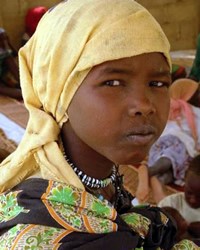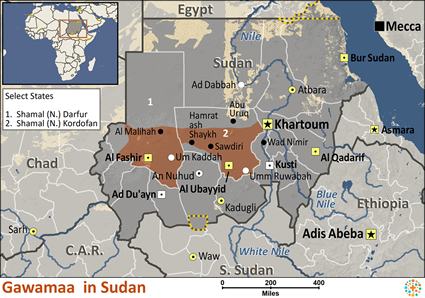The Gawamaa people of Sudan are part of the Baggara people group, which numbers over one million and is the second largest people group in western Sudan.
The Baggara peoples identify with their tribal names more often than with the all-encompassing term baggara. These nomads originated from the Guhayna group, a clan of Bedouin Arabs who poured across the Sinai Peninsula from Saudi Arabia and eventually successfully invaded the Nile region of upper Egypt and surged into the Sudan in the year 1504. After a time, the Baggara branched off from the large Guhayna clan and took their name because of their newfound opportunity to herd cattle in the savanna region of the Sahara Desert (the Arabic word for "cow" is baqqara). After staking their claim on the land, they intermarried with the Africans who originally inhabited these regions, resulting in their dark skin.
They are primarily nomadic cattle herders, and their journeys are dependent upon the seasons of the year. Other Baggara family groups have settled in larger villages or cities.
Not much is known about the Gawamaa people specifically, although it is thought that much of their daily life and religious practice shows strong similarities to all of the Baggara people of Sudan.
The women wear tobes, loose-fitting covers draped about the body and over the head, on a daily basis, but they do not veil their faces. During wedding celebrations and other festivals, the younger women dress in costumes which reveal their figures, and their heads remain uncovered in order to display their ornate hairstyles and feathered headbands. They dance with the men and their movements can only be associated with those of African origin.
The amount of gold worn by a man's wife during these festivals and the number of cattle within his herd are the determining factors of his prestige within the community. The men wear pristinely white jallaybiyas, dress-like cotton robes which reach mid-calf, and pants underneath. The turbans for their heads are worn thicker in the villages than in the cities for better protection against the Sahara sun.
Men and women do not eat together unless they are married. The women prepare the meals and take the food to the men's racuba (place for shelter and resting) three times each day. Spending time together is a vital part of Arab community living, and for one to deny his friends or family this time is highly looked down upon. There are few extra-marital relationships between men and women, even on a friendship level.
Boys and girls are circumcised between the ages of 5 and 7 years. A festival ensues for each candidate, and the child is encouraged to not cry because a 'crier' will forever be labeled so. The women have extreme difficulty in child labor because of the circumcision. It would be considered unclean for a woman to not be circumcised and she would not be acceptable to marry.
Men are allowed to have four wives, according to the Quran, but most cannot afford to support this number. Most men have only one or two wives and a very large number of children.
To many southern tribes of the Sudan, the Baggara were once known as 'the raiders,' as they were and still are on the front lines of the civil war between the North and South. Many of the Baggara tribes were responsible for raiding Southern civilian villages, taking women and children as slaves, and stealing property such as cattle with the simple dismissal that these were the "spoils of war." Relations at this point are said to have improved; however in most cases the damage is irreparable.
Because the Baggara as a whole are not an educated people, few are involved with the political arena in the capital city of Khartoum. They have strong opinions about political ideas; however, these views are biased because of their nomadic living situation.
Most if not all the Gawamaa are Muslims.
Those with skills in water purification and treatment could provide help and better health for this people group living in the dry climates of Sudan.
There is a great need for help in the Darfur area. Any humanitarian aid workers would provide immense relief to the Gawamaa and other peoples in the area.
Pray that God will open up the doors for His Word to be spread among the Gawamaa peoples of Sudan.
Pray that the Church will hear the call to love the Baggara peoples and the other northern Muslim tribes of Sudan.
Ask God to provide relief from the genocide occurring in the Darfur region.
Pray that God will raise up many intercessors to pray for the Gawamaa, as it is promised that people from every tribe will worship Him.
Ask the Lord of the Harvest to raise up workers among the Gawamaa people.
Scripture Prayers for the Gawamaa in Sudan.
| Profile Source: Anonymous |

























